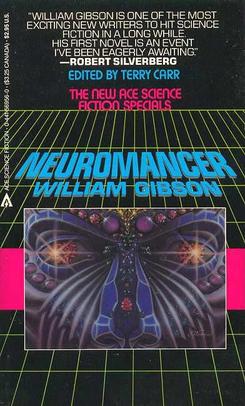Case** was a 'cowboy', a hacker roaming the virtual reality of the matrix, a global network representing all the world's computer systems. When he stole from his employers, though, they rewarded him by crippling his nervous system, making it impossible for him to ever 'jack in' again. Now he's a petty criminal with a death wish in Night City, Japan, a wretched hive of scum and villainy - until he's given another chance by a mysterious commando, Armitage, and cyborg action girl Molly, to be cured and take on the powerful Tessier-Ashpool corporation.
Before long, it turns out that their real employer is an artificial intelligence called Wintermute, owned by Tessier-Ashpool, which (who?) is trying to free itself from the restrictions legally imposed to prevent AIs from becoming too powerful and turning into Skynet. AIs are the big boys in cyberspace: cowboys tend not to go near them since attempting to attack an AI tends to result in deadness (because if you're killed in the matrix, that's it). Eventually, Case and 'the Flatline', the digitised mind of a braindead cowboy, attempt to breach an AI with a sophisticated virus, taking hours to break through the 'ice' (firewalls) protecting the system.
It's a heist novel, and there's an Avengers Assemble! sequence a third of the way in. But the whole thing is compromised by the shallowness of the characters, who are barely established and never developed. Molly, for example, is an action girlfriend, and that's it, and that makes later passages, when we're supposed to be invested in the characters, less compelling. Neuromancer does not much care: Gibson is much more interested in developing ideas of cyberspace. But it's regrettable, especially when Case at least is set up in a promising way:
A year here and he still dreamed of cyberspace, hope fading nightly. All the speed he took, all the turns he'd taken and the corners he'd cut in Night City, and still he'd see the matrix in his sleep, bright lattices of logic unfolding across the colorless void... The Sprawl was a long strange way home over the Pacific now, and he was no console man, no cyberspace cowboy. Just another hustler, trying to make it through. But the dreams came on in th Japanese night like livewire voodoo, and he'd cry for it, cry in his sleep, and wake alone in the dark, curled in his capsule in some coffin hotel, his hands clawed into the bedslab, temperfoam bunched between his fingers, trying to reach the console that wasn't there. (p. 11)Case is an addict who's been forced to go cold turkey. But the theme of his obsession with cyberspace is not developed properly. Once he's cured by Armitage, that's it, and cyberspace never becomes problematic again.
The writing is at once compelling and frustrating. Since I'm a fan of Raymond Chandler, Gibson's use of the hardboiled style shouldn't be too much of a problem, and there are some real gems, like the wonderfully evocative opening sentence ('The sky above the port was the color of television, tuned to a dead channel'). But whatever else you might say about hardboiled, being terse and peppered with colloquialisms it's not easy to read. Gibson makes it tougher still by throwing in a great deal of technobabble and future slang, and in consequence I felt like an idiot for stretches of the novel by not understanding very much at all. It makes sense, I suppose: Case as a 'cyberspace cowboy' is a future Philip Marlowe, who is himself a twentieth-century urban cowboy. At least we were spared a first-person narration.
As a vision of the future, Gibson's cyberpunk has three elements: virtual reality, advanced cybernetics, and general societal decay. The first is more interesting than one might think, considering virtual reality was abandoned in the nineties: the matrix, controlled by megacorps and difficult to access without sophisticated equipment, is at the very least a fair approximation of Web 1.0. Cybernetics is a much more interesting subject in a society obsessed with youth and beauty, and Gibson evokes it well, although there's a great deal of potential for body horror that is never exploited. Lastly, the decay: Neuromancer is not detailed in this regard, but there appears to have been some sort of nuclear war at least in Europe, which the US did not win. Organised crime appears to have become much more powerful (the Yakuza are an international organisation).
For a satisfying novel, however, Neuromancer has too many ideas and does too little with them. Case's interactions with artificial intelligence in cyberspace are pretty terrific, and I very much like Gibson's take on AI: unlike, say, HAL's grasping, childlike incipient humanity in 2001: A Space Odyssey, Wintermute is ineffable, too strange to be quite comprehended by people (and conversely unable to quite understand them). There are embarrassments, like the cringeworthy Rastafarians in space! the protagonist encounters. Neuromancer does a lot of heavy lifting in creating a world and introducing a plethora of ideas, and so its flaws may be forgiven; I only hope the other books in the series add more depth.
*Yes, that's a reference to the Spirou album of the same name, which unsuccessfully attempted to retool one of the best-loved BD to a noir techno-thriller. It didn't work very well, to say the least, and ended Tome and Janry's run on the series.
**Gibson's fondness for monosyllabic character names (Case, Zone, Wage, Finn, Chin...) is quite irritating.

No comments:
Post a Comment